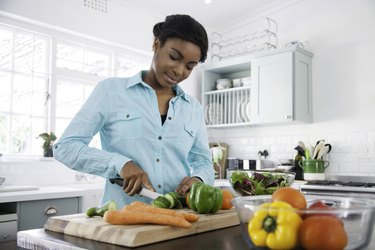
You can prepare vegetables the night before cooking them by washing and cutting or chopping them, then storing them in the fridge in an airtight container. You may also want to pre-cook vegetables for your recipes to save you time in the kitchen.
Most pre-cooked vegetables will keep in the fridge for several days if stored correctly. If stored incorrectly, they may spoil faster or become soggy.
Video of the Day
Video of the Day
Tip
For holiday recipes like casseroles, you can prep and pre-cook vegetables the day or night before to save time the day of.
Cooked veggies can stay in the fridge for three to four days when stored in an airtight container.
How to Pre-Cook Vegetables
There are several ways to pre-cook vegetables. Choose from the methods below.
Blanch and Shock
Pre-cooking vegetables with the blanch and shock method is one way to speed up the cooking process for recipes you'll be making with them. Blanching is the process of immersing food in boiling water for a short time, and shocking required submerging the vegetables in ice water immediately after. This helps preserve the vegetables' color and texture but does not significantly affect their nutrient content.
Cook vegetables in boiling water for two to four minutes, or until crisp-tender, then transfer to ice water until they are no longer warm to the touch. Be careful not to over-blanch your veggies, or they'll lose some vitamins.
You can refrigerate pre-cooked veggies for three to four days.
Roasting
Roasting vegetables adds a more unique flavor than the blanching and shocking process. This method imparts a nutty flavor and intensifies the natural sweetness in vegetables, such as yams and green beans.
Just season your veggies with healthy cooking oil and any spices you like, place them on a lined baking sheet with parchment paper and roast them in your oven at 475 degrees Fahrenheit until tender and brown around the edges.
Cooking times will vary depending on the size and type of your vegetables. Once they're out of the oven, allow them to cool, store them in a plastic container and refrigerate overnight.
Mashed Potatoes
Of all vegetable dishes, mashed potatoes are hard to make ahead and store. Once chilled, fully cooked mashed potatoes can turn gooey or dry out.
To avoid this, try microwaving whole potatoes for 16 minutes on high and flipping them halfway through the cooking process. Then, cook your potatoes in a 350-degree Fahrenheit preheated oven for 30 minutes. Let the potatoes cool, cut them in half and scrape the flesh. Then, you can refrigerate the potato flesh overnight and when you're ready to serve, simply warm them in the microwave and mix in any flavorings, such as Greek yogurt, butter or salt.
How to Prepare Vegetables and Store Them Overnight
You can safely and easily prepare vegetables and store them in the fridge overnight before using them in your favorite recipes.
Prepping ahead means washing, peeling (if needed), and cutting, chopping, slicing or dicing your veggies according to the recipes you'll be using them in. After that, it's as simple as storing the vegetables in an airtight container and placing them in the fridge overnight.
How Long Do Cooked Veggies Last?
Cooked vegetables stored properly in an airtight container will stay good in the fridge for at least three to four days, per the USDA. Some chefs and food experts say cooked veggies last as long as seven days with proper storage.
The amount of water in certain types of veggies may cause them to degrade in texture. Vegetables with a high water content, such as zucchini, tomato, celery, asparagus, mushrooms, cabbage and bell peppers may only last up to five days cooked. Veggies with lower water content, including spinach, peas, celery, cauliflower and potatoes may last longer.
How to Reheat Steamed Vegetables
Steamed vegetables cooked over a small amount of boiling water is a one of the best ways to get nutrients, says Joanne Larsen, RD, member of the Academy of Nutrition and Dietetics.
When steaming veggies, test them after approximately five minutes and stop cooking when they're just tender enough so a knife pierces them, but they still have a crisp texture.
Place your leftover steamed vegetables in an airtight container and store them in the refrigerator. When ready to reheat, put them in the microwave and heat only to serving temperature (140 degrees Fahrenheit). to prevent a significant loss of nutrients, Larsen says.